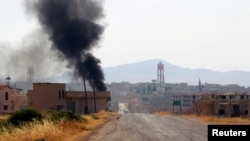The United States is skeptical an agreement with Russia to decease violence in Syria can work but will keep pursuing it nonetheless, President Barack Obama said Sunday as negotiators from both countries edged toward a deal.
Obama, speaking on the sidelines of the Group of 20 economic summit in China, said the U.S. and Russia still have “grave differences” about what's needed to end Syria's civil war and which opposition groups are legitimate targets for the U.S. and Russian militaries. But he said “it is worth trying.”
“We're not there yet,” Obama said. “I think it's premature for us to say there's a clear path forward, but there's the possibility at least for us to make some progress.”
A deal could be announced as early as Sunday by U.S. Secretary of State John Kerry and Russian Foreign Minister Sergey Lavrov, said a senior U.S. State Department official, adding that the two countries were close to a deal but still had unresolved issues. The official wasn't authorized to discuss the negotiations publicly and requested anonymity.
Kerry and Lavrov have been deep in talks for weeks over a deal to boost U.S. and Russian military cooperation to fight the Islamic State group and other extremists in Syria - a step Moscow has long sought. The package would include provisions so aid can reach besieged areas of Syria and measures to prevent Syrian President Bashar Assad's government from bombing areas where U.S.-backed rebels are operating.
U.S. officials have said that as part of a deal, Russia would have to halt offensives by Assad's government, something it has failed to do over months of diplomatic efforts. They said the U.S. must get rebels to break ranks with the al-Qaida-linked Nusra Front, a task that grew tougher after Nusra fighters last month successfully broke the siege of Aleppo, Syria's largest city and the site of fierce recent fighting.
Though negotiators have been hopeful a deal could come together while world leaders are gathered in Hangzhou for the G20, that optimism has been tempered by the failure of previous ceasefire deals to hold. The U.S. has long been wary of increasing military coordination with Russia in Syria's civil war because it says Russia continues striking moderate, U.S.-backed opposition groups in a bid to prop up Assad. The U.S. wants Russia to focus exclusively on IS and al-Qaida-linked groups.
Obama and Russian President Vladimir Putin plan to huddle on the sidelines of the summit, the White House said.
For Obama, a military partnership with Russia would mark a significant change. When Russia started bombing targets in Syria last year, the U.S. declared the intervention an act of desperation and said its coalition fighting IS wasn't coordinating with Moscow. The minimal cooperation focused on avoiding mid-air collisions between Russian and coalition planes.
The new approach would involve intelligence and targeting cooperation. Assad's forces would be barred from attacking areas outside of IS' control; attacks on Nusra and its allies would be up to the U.S. and Russia to work out among themselves in their Joint Implementation Group. Defense Secretary Ash Carter and National Intelligence Director James Clapper both have expressed misgivings.
Discussions about the intractable Syria conflict and the related fight against IS have been a major focus as world leaders gather for the G20, which brings together the world's major economies. Obama met first Sunday with new British Prime Minister Theresa May, then with Turkish President Recep Tayyip Erdogan for their first sit-down since failed coup in his country in July.
Obama called the attempted overthrow “terrible.” He assured Erdogan that his national security team and the Justice Department would ensure that those responsible are brought to justice, a reference to Turkey's extradition request for an exiled cleric it holds responsible. The U.S. is still weighing Turkey's evidence against Pennsylvania-based cleric Fethullah Gulen.
Turkey's demands for the U.S. to hand over Gulen have coincided with growing clashes between Turkish forces and U.S.-backed Kurds in Syria. The Pentagon has backed the incursions, but said they should only be aimed at IS fighters. Turkey has used the operations to push back Syrian Kurds it accuses of seeking to claim more territory.
Obama called Turkey a key ally in the campaign to defeat the Islamic State and said “we now need to finish the job” of securing Turkey's border with Syria.
Since the failed coup, the U.S. has been alarmed by Turkey's diplomatic flirtations with Russia, Assad's patron, and softened demand for Assad's exclusion from a political transition.
Erdogan said it was important for the U.S. and Turkey to “embrace a common attitude against terrorism.” In a reference to Washington's support for the Kurds, he said there are “no good terrorists or bad; all terrorism is bad.”




